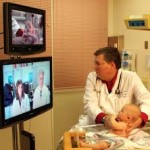A man over 40 is almost six times as likely as a man under 30 to father an autistic child … a man’s chances of fathering offspring with schizophrenia double when he hits 40 and triple at age 50. The incidence of bipolarity, epilepsy, prostate cancer and breast cancer also increases in children born to men approaching 40.
A man over 40 is almost six times as likely as a man under 30 to father an autistic child … a man’s chances of fathering offspring with schizophrenia double when he hits 40 and triple at age 50. The incidence of bipolarity, epilepsy, prostate cancer and breast cancer also increases in children born to men approaching 40.
Both dwarfism and Marfan syndrome (a disorder of the connective tissue) have been linked to older fathers, and according to research published in 1996 in the journal Nature Genetics, Apert syndrome (a disorder characterized by malformations of the skull, face, hands and feet) is a mutation caused exclusively by advanced paternal age.
A 2009 study at the University of Queensland, Australia, found a correlation between advanced paternal age and poorer performance by children on intelligence tests (the children of older mothers actually performed better). And when researchers at King’s College, London, bred mice from fathers of differing ages, the offspring of older fathers exhibited significant deficits in social and exploratory behavior.
Full article on late-in-life fathers.








